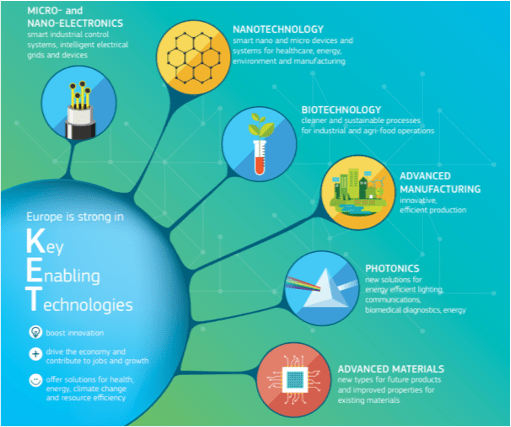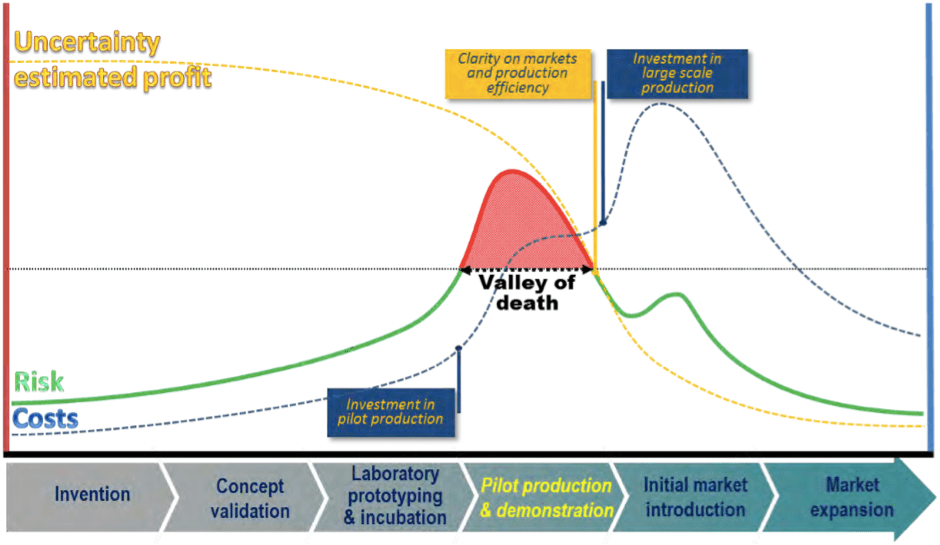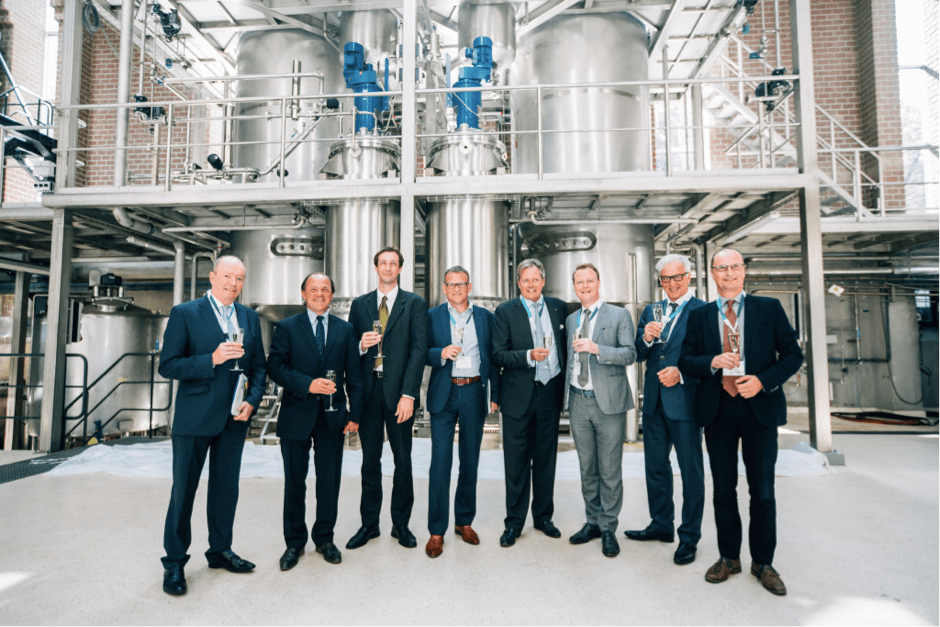Importance of Key Enabling Technologies
Advances in novel technologies and manufacturing practices are essential to building and maintaining a global leadership position. With this rationale, the European Commission has identified six Key Enabling Technologies (KETs) that it considers instrumental to the modernization of Europe’s industrial base. The High Level Group on Key Enabling Technologies believes that these new technologies will be crucial to solving societal challenges and facilitating the transition to a low-carbon, knowledge-based economy with high-quality jobs (1) .
This strategic approach, currently implemented as the Horizon 2020 program (2), aims to optimize the use of scarce public resources by shifting the attention to close-to-market technological inventions. With a focus on bringing these great ideas from the lab to production, Horizon 2020 promises more breakthroughs that will generate actual economic and societal benefits.
Pilot production in Key Enabling Technologies
The largest barrier to entry preventing laboratory prototypes from becoming commercial products is the high cost associated with pilot production and demonstration. However, it is a necessary expense, because pilot production is an essential step in the product development cycle. Piloting is the only way to meet initial demand and to generate realistic data on the performance of novel products and processes. Additionally, pilot production leads to a better understanding of the market and the expected profits.

Traditionally, pilot production activities require huge investments to cover infrastructure, equipment and highly specialized multi-disciplinary personnel. It is not uncommon for the cost of pilot production to be five times higher than the earlier research stages. In the industrial biotechnology sector, more than 50% of pilot production projects require an investment of more than 1 million euro (3).
In other words, significant investments are required before uncertainties can be reduced, a scenario that is unappealing to private investors and enterprises, since there is no guarantee that a product or process will be successful. The pilot phase in the product development cycle is therefore often described as the “Valley of Death.” Once a process has been demonstrated on the pilot scale, the risk decreases, and the potential for valorization of the technology becomes more apparent.

Multi-KETs Pilot lines project
Pilot production is clearly a vital yet weak link in the successful industrialization and valorization of KETs. Without public support for piloting, it is unlikely that the Valley of Death can be crossed, meaning that society will not benefit from the public investments into research and development. The multi-KETs Pilot lines project was established to form a common understanding and develop a consensus for policy actions by studying the existing policy and industrial initiatives regarding pilot production at four leading pilot facilities, including Bio Base Europe Pilot Plant (Ghent, Belgium).
The project showed that pilot production requires the following elements:
- R&D to validate the technology in a laboratory environment and to transfer it to the level of pilot manufacturing
- A pre-commercial pilot manufacturing facility that is open to external parties like large enterprises, SMEs and research organizations for assessing the feasibility and cost efficiency of production processes
- The ability to adjust the product or process design based on pilot production
- Initial production of pre-commercial product batches for testing and validation
- Business development to attract investors and to create market relationships with customers
- Development of a value chain around the new product to prepare internal and external organizations for full-scale manufacturing
Shared facilities for pilot production
Shared facilities help innovators bridge the Valley of Death by reducing the risks and costs associated with pilot production. These facilities, which are open to all companies and research institutes, offer state-of-the-art infrastructure and broad expertise. With their strong central position in the innovation network, shared facilities can help create value chains and open strategic partnerships between academia, industry, public authorities and cluster organizations.

The highly dynamic nature of pilot production for KETs requires a flexible organizational structure. Even large enterprises can benefit from contracting an external party that specializes in pilot production, instead of or in addition to their own piloting facilities. For SMEs, which typically have limited human and financial capital, shared facilities are often the only way to bring their products to the market.
Shared facilities are usually non-profit organizations, created with public funding. While their core business model is to charge a fee for assisting with pilot production, these facilities can also offer other services, such as:
– Training of highly skilled experts
– Commercial production of low-volume specialty products
– Enhancing the innovation ecosystem through workshops, partnering events and conferences
– Incubator services to support entrepreneurs and early-stage startup companies with office space, training, networking and funding applications
As the fees paid by customers rarely cover the large overhead costs, shared facilities can become unsustainable. To sustain and thrive, shared facilities need to find new customers at both the national and international levels. This can be challenging since there is a lack of awareness of their services. Also, if European regions do not coordinate their investments in shared facilities, there is a risk of market saturation.
A coordinated approach and continued public support for shared facilities are therefore crucial to safeguard their long-term existence; otherwise, the initial public investment will eventually be lost. It is important that pilot production receives a balanced commitment from all stakeholders.
The European Union program for research and innovation, Horizon 2020 https://ec.europa.eu/programmes/horizon2020/, has dedicated more than 6 billion euro to innovation activities for KETs between 2014 and 2020. Additionally, innovations in KET pilot production are also supported under the European Structural and Investment Funds (ESIF) http://ec.europa.eu/contracts_grants/funds_en.htm for concrete regional investments in innovation, which has a budget of around 100 billion euro available in the same time period.
In industrial biotechnology, the future is now!
In the industrial biotechnology sector, there are a number of projects that are up and running, all of which aim to reduce the barrier to pilot production across Europe.
In the next four years, the leading European pilot plants in the industrial biotechnology sector will be working together on the SmartPilots project http://www.bbeu.org/pilotplant/smartpilots/ (funded by Interreg Europe). This initiative will implement the policy actions proposed by the multi-KETs Pilot lines project in order to increase the impact of the industrial biotechnology KET on the European economy. The objective is to improve regional policies for shared pilot production facilities by optimizing support for both the facilities and their users, and by facilitating interregional cooperation.
There is also the Bio-based industries joint undertaking http://www.bbi-europe.eu/, an effort that encourages partnerships between the public and private sectors to address the challenges involved in commercializing sustainable bio-based products and biofuels. A budget of 3,7 billion euro is allocated to the demonstration of such technologies and to set up flagship biorefinery plants.
With help from pilot production funding and facilities, promising innovations finally stand a fighting chance of surviving the Valley of Death and reaching the commercial market.
References
(1) European strategy for KETs
(2) What is Horizon 2020?
(3) Pilot production in Key Enabling Technologies
Image: The Valley of Death, the innovation phase between laboratory prototyping and successful market introduction that comes with a high technological and financial risk. Pilot production in Key Enabling Technologies
Image: The inauguration of a new 15m3 fermentation line for pilot production at Bio Base Europe Pilot Plant, purchased and installed with the financial support of Flanders, the European Regional Development Fund, Interreg IVB and the Province of East-Flanders. (Photo by Fille Roelants, courtesy of Bio Base Europe Pilot Plant)[/vc_column_text][/vc_column][/vc_row]


